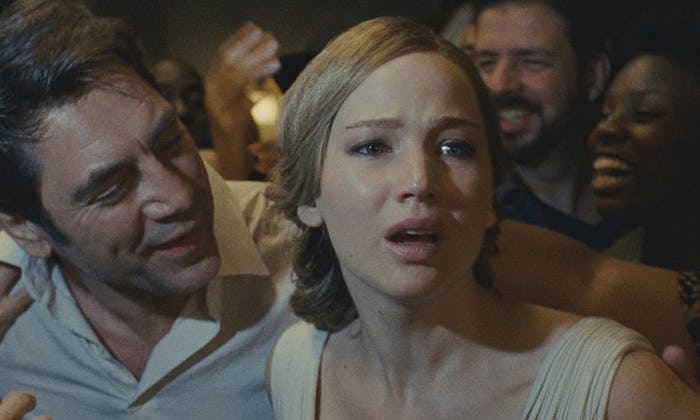Entertainment

'Mother!' Is Full Of Important Themes, & You May Have Totally Missed Them
I went into the mother! premiere with one thing in mind: it was going to be disturbing. It lived up to that. It lived up to that and then some. The film, which has been teased for a while now but never explained by the stars and creator at the risk of ruining it, is a lot. And even as I'm writing this, I know that this film is meant to be seen — eh, witnessed — and not just read about. It's more than a viewing experience, as often Darren Aronofsky films are, and it will stick with you. So much so, you'll probably be contemplating the meaning of mother! and what it is about for some time after seeing it. You're not alone, support groups are being made as you read this, but in the meantime, we need to talk about what mother! means and all of the metaphors you might have missed.
(Warning: spoilers for the entire plot of mother! are ahead.)
The reviews of the film are pretty consistent at the time of the premiere. Critics are applauding Lawrence for her titular role as mother, and others are just going on about the insanity of the film. (At the time of this article's publication, the film has 77 percent on Rotten Tomatoes.) If you're familiar with Darren Aronofsky, this isn't too surprising — Requiem For A Dream and Black Swan are a couple of his other films. Jessica Kiang summed up the film perfectly in her review for The Playlist by saying,
The only way to warn you without spoiling is to say that foolhardy is the soul who believes that, having witnessed what you’ve just witnessed, the film cannot possibly get any more insane. It can always get more insane, and it always does.
After seeing mother!, you may find yourself more confused than you were walking into the show. The allegories and metaphors run heavy in the film, and sometimes a scene can feel so dense that it is almost suffocating. Are you reading those characters right? Does that scene actually mean what you think it means? (This is Aronofsky, so probably not.) Either way, let's try to work through the meaning and symbols of mother!, shall we?
The Bible
If you have read reviews of mother! before going into the film, the religious allegories running through the film are probably pretty obvious. If you haven't seen many reviews and are a little rusty on your Old and New Testament, then this is probably going to blow your mind. As noted in FilmInk's review of the film, the original visitors (because they are never named in the film, I will refer to them by the actors) Ed Harris and Michelle Pfeiffer represent Adam and Eve. Their names on IMDB are Man and Woman, which is pretty spot on for Adam and Eve in the Bible.
Then there are their sons, the two men who, also unnamed, come and wreak havoc on mother's home. The sons of Adam and Even are Cain and Abel, and according to the Book of Genesis, God favored Abel over Cain (like Ed Harris favoring the one son over the other in his will), and Cain murdered Abel. Sound familiar?
Another thing to look at is the lack of character names, and how important those are to the story. Javier Bardem plays Him, with a capital "H." In religious text, God is oft referred to as Him, or He, as noted in a Harvard article. He is worshipped by hundreds of adoring fans who kill, pillage, and loot for him — to be closer to him. Plus, and arguably the most in-your-face-you-may-miss-it, Him writes the new word of God when Javier Bardem writes his new work of art.
Earth
J.Law has been quite helpful with this one, since she admitted it in her interview on The Tonight Show before the premiere of the film. When talking about the plot of the film, as loosely as one can during a media circuit, Lawrence admits that the home in the film represents Earth. She, as mother, is basically the human embodiment of Mother Earth, tending to her home, and watching people destroy it. Overpopulation, limited resources, disease, greed, filth, it's all there, and as we see by the end of the film, the home (and mother) are destroyed. Nothing was enough to save it, not even mother's love.
Love & Art
By the end, the film becomes a little more straightforward with its approach in conveying meanings. As Him hovers over mother in the final moments, he says that nothing will ever be enough, and if it were, he wouldn't have to create it. Not only is this screaming religious undertones (why did God create chaos, violence, and death?), but it is also a strong statement on the artist and the artist's love of those loving him. As mother says in the film, he loved mother because of how much she loved him. It was the same as the adoring "fans" that destroyed his life and the life mother had tried to build in the home. As we see in the last moment, there was one thing he needed from her, and that was her love, but in the purest form — her heart. It is what kept his art going, and it would continue to go on and on as the next mother took Jennifer Lawrence's mother's place in the house.
Of course, this film joins the ranks of Many Meanings because of its writer (Darren Aronofsky). The wonderful thing about art is you can interpret it in many different ways. Nothing is set in stone, until it is hovering on Javier Bardem's mantel in his office.